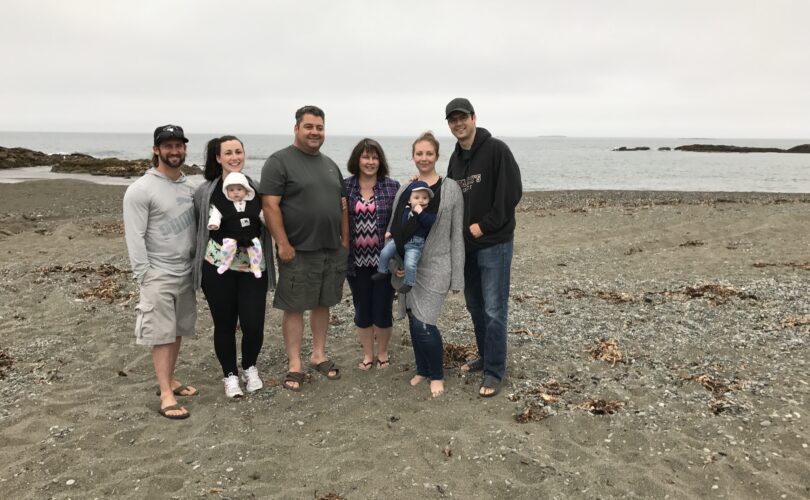It’s been a year and a half since I’ve seen my parents, and even longer since I’ve seen my brother, sister in law and nephew.
I just found out ALL of them are coming to visit me very soon!
To say I’m excited is an understatement. I am so full of joy to be reunited with my family finally!
I’ve been waiting for this moment for so long it felt like it was never going to come. I’ve cried over all the moments we’ve both missed being so far apart, and also felt extreme gratitude that we’ve all stayed healthy and for the most part financially secure during this rollercoaster of a year.
Joy floods in thinking and planning of all the fun things we will do.
I google all the options that are safe and fun for the full family.
I think of meal plans, start the grocery order. Wonder which restaurants we should order from that they don’t have back in Nova Scotia.
I couldn’t be more excited.
So why then does my brain suddenly flash to disaster. I’m in a moment of pure joy, I check the weather for the week and the thought crosses my mind that weather might be a little rough that week, what if we get a tornado.
Next thing I know, I’m planning on my mind where will take cover in the basement, what we need to protect us down there, maybe we should put the couch cushions over our heads, maybe I should be ready to bring a mattress to hide under. Of course we will need water down there in case we get trapped, maybe veggie pouches for the kids.
Oh no,….What if we waited all this time to get together again just to all be wiped out together in one moment by a tornado!?
The worst case scenario, impeding doom, a catastrophe thought loop.
All of this flashes through my mind in less than 30 seconds.
Does this happen to you?
Why do we do this?
This type of catastrophic thinking can be more common than you realize.

Here’s some examples of how these thoughts could spiral:
The freckle on your arm must be cancer.
A mechanical issue on the plane means it’s going to crash.
If your six year old kid doesn’t make this team their whole sports career is over. Maybe it will ruin their life completely.
If you fail this test you’ll never graduate and never be able to get a job.
When a relationship is over you think you’ll never love or be loved again. You’ll spend forever alone and miserable.
We messed up a project at work and we think we will get fired and end up homeless.
Basically we take a situation and blow it up to the absolute most catastrophic event we can imagine up.
I talked before about your body not being able to recognize the difference between reality and a thought cycle.
This is where this kind of thinking can be damaging to us. If we don’t quickly recognize it as irrational and move away from the thought, we trick our body into thinking it’s actually happening.
Our brain is thinking, and our body is reacting to that worst case scenario. We start to worry, and stress, maybe even cry. The brain will release a stress hormone of cortisol which is going to physically effect us now.
We are now in a fight or flight state.
If we stay fixated here we can cause our heart rate to rise, blood pressure to rise and even induce some insomnia as we often aren’t able to sleep in this state of stress.
Other functions of our brain and body are put on hold because our body thinks the priority now is survival against this impeding doom we’ve just created in our heads.
I’m no stranger to this thought process and it’s effects. This habit of worst case scenario thinking has peaked its head before. However I’m very mindful of it. I can pick it out more quickly and move out of that fear and ground back into the actual reality of the situation.
If you find yourself getting trapped in thinking about worst case scenario situations, pause and take a mindful minute for yourself. The thought popping into your head can just be a passing thought with practice and not take hold.
Try some of these options.
1. Focus on your breath for 30 seconds
2. Talk it out with someone you trust, and someone who will be truthful and honest with you.
3. Journal, write out all your worst fears in a writing rant to get it out, and then shift the writing into what is more likely to go right.
4. Ask yourself the odds of that fear actually happening, what are the odds the best case scenario will instead
5. Brainstorm all the best case and “better case” outcomes possible
6. Set an intention to create the experience you want to have.
7. Name the fear. Say to yourself, that’s not likely at all, I’m just afraid of….(fill in the blank)
8. Practice yoga, a daily practice of connecting your body and mind will improve your ability to be mindful in other areas of your life as well.
Once you’re ready for that mindset shift, and recognized what is actually going on in your head it’s time to shift it back to the best case scenario.
Focus on the potential for greatness
The opportunities
The gratitude
The joy
The fun
What’s the best that could happen, second best, third best. Focus on each of those.
All the things that are more likely to happen.
We will create what we fixate on, so create the positive experience you want to have instead.
These fears and doomsday thoughts are normal to have, just don’t stay stuck there.
We fear loosing what we love most, so sometimes when everything is wonderful our brain can creep into fearing that eventually it won’t be here anymore. This all comes from the more primitive parts of our brain and is just rooted in a fear.
Don’t let it run the show.
Our higher consciousness knows better, and practicing mindfulness will give you the skills to stay within a positive mindset.

If you’d like to work on mindset and mindfulness practice together, send me a message.
*** Please remember as well, there is a difference between an intrusive thought that you have the control to change, and suffering from anxiety or depression. If these little tips don’t help, and you do find yourself stuck or very much effected by this type of thinking on a regular basis, please talk to your doctor about finding a professional who can help. ***



